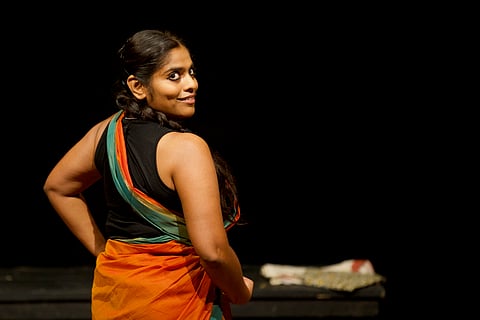
- LIFESTYLE
- FASHION
- FOOD
- ENTERTAINMENT
- EVENTS
- CULTURE
- VIDEOS
- WEB STORIES
- GALLERIES
- GADGETS
- CAR & BIKE
- SOCIETY
- TRAVEL
- NORTH EAST
- INDULGE CONNECT

What does it mean for a woman to desire—and what does it cost her? That question drives Shoorpanakha: A Search, an arresting new solo theatre production that reclaims the narrative of one of Indian mythology’s most misunderstood characters. Created and performed by theatre practitioner Parshathy J Nath, the play opens up a rarely explored chapter of the Ramayana, positioning Shoorpanakha not as a caricature of desire, but as a woman searching for agency, voice, and visibility.
"She’s a character who fascinated me precisely because she was so marginalised," says Parshathy. “Her only 'crime' was expressing desire—something that women still get punished for in different ways.” In the epic, Shoorpanakha is humiliated and mutilated after declaring her love for Rama, a narrative arc that has long been used to define female transgression. For Parshathy, the character became a mirror reflecting deep-set patriarchal norms still alive in contemporary gender dynamics.
From the start, this wasn’t just a character study. Shoorpanakha: A Search is also a personal and physical investigation for Parshathy as an actor. Drawing from a wide repertoire of Indian performance traditions—Koodiyattam, Kattaikkuttu, Oppari, Parai, and Mizhavu—the piece is both a reclaiming of Shoorpanakha’s story and a shedding of the performer’s own inherited body language. "As someone trained in classical dance and Carnatic music since childhood, I had to confront and go beyond those learned ideas of what feminine performance looks like,” she explains.
The result is a layered, visceral performance in which two journeys run simultaneously: Shoorpanakha’s fight for narrative space, and the actor’s pursuit of a liberated performance vocabulary. “I wanted to break the confined physicality that classical forms impose—where even the ‘ideal woman’ has a specific posture, a specific gaze,” says Parshathy. In Kattaikkuttu, she found an expansive and embodied masculinity; in Oppari, a form that channels grief into collective voice; and in Koodiyattam, a surprising space where Shoorpanakha is given a full backstory and emotional range.
Each form, she says, revealed a new facet of the character—and of herself. "I placed Shoorpanakha in a Dravidian landscape, not just geographically, but culturally. Her wildness isn’t deviant; it’s just different. And that difference has been punished through history.”
The play is constructed as a dialogue between text, form, and the body. Featuring live music, powerful physicality, and fragments of regional art practices, Shoorpanakha: A Search is not just a re-telling—it is a re-imagining.
While the play is written and performed by Parshathy, it is far from a solo endeavour. The work was developed under the mentorship of acclaimed theatre director Sharanya Ramprakash, and supported as a Foundation Project by the India Foundation for the Arts (IFA) under the Arts Practice programme, with funding from the Sony Pictures Entertainment Fund.
Parshathy also credits her mentors and trainers for shaping the journey—from Aparna Nangiar’s guidance in Koodiyattam to P. Rajagopal’s reimagining of Shoorpanakha in Kattaikkuttu, and the grounding force of Parai music learned under Gangai master and Manimaran. “Each of these forms shocked my performance vocabulary in the best possible way,” she says.
June 22. 7.30 pm. At Medai - The Stage, Chennai.